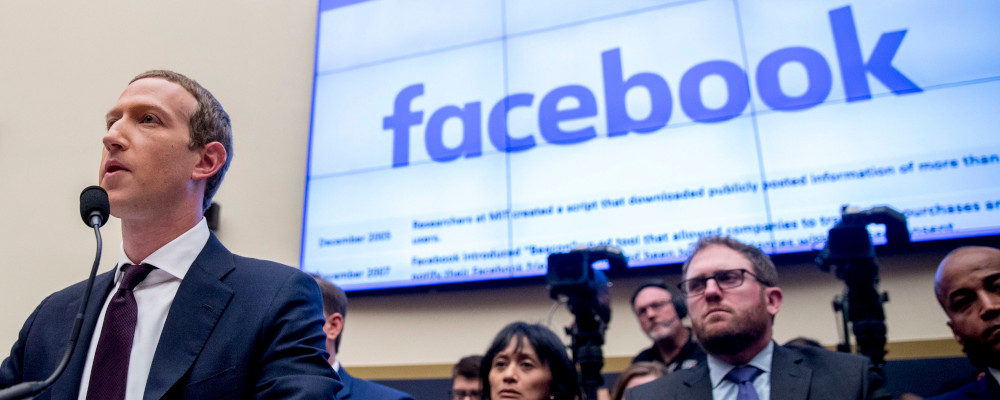The following is an edited version of the opening remarks delivered by Jamil Jivani, president of the Canada Strong and Free Network, in his debate with Reason Magazine’s Robby Soave on the question of regulating big tech. The debate took place in Ottawa on Friday, May 6 at the 14th Canada Strong and Free Networking conference.
I’m going to probably surprise some people by starting my pro-regulation argument by quoting a libertarian think tank. The eighth edition of the Cato Institute’s handbook for policymakers explains why we should believe in the principle of limited government. Cato states, “Advocates of limited government are not anti‐government, per se, as some people charge. Rather, they are hostile to concentrations of coercive power and to the arbitrary use of power against right.”1“Limited government is one of the greatest accomplishments of humanity. It is imperfectly enjoyed by only a portion of the human race; and where it is enjoyed, its tenure is ever precarious. The experience of the past century has made clear the insecurity of constitutional government and the need for courage in achieving it and vigilance in maintaining it. Advocates of limited government are not anti‐government, per se, as some people charge. Rather, they are hostile to concentrations of coercive power and to the arbitrary use of power against right. With a deep appreciation for the lessons of history and the dangers of unconstrained government, they advocate for constitutionally limited government, with the delegated authority and means to protect our rights, but not so powerful as to destroy or negate them.” https://www.cato.org/cato-handbook-policymakers/cato-handbook-policy-makers-8th-edition-2017/limited-government-rule-law
My support for regulating big tech is based on these very same concerns with concentrations of power. It would be a mistake to think that conservatives should only be concerned with power in government hands. We ought to be consistent in our desire to see appropriate checks and balances, wherever power might concentrate.
There are many ways we could go about documenting big tech’s unprecedented power. For example, in Canada, the duopoly of Facebook (now known as Meta) and Google receive 80 percent of digital advertising revenues.2“Google and Facebook continue to dominate the $8.8 billion internet advertising market in Canada. In 2019, for example, their combined share of the online advertising market climbed to 80%, a significant increase from 72% in 2016.” https://nmc-mic.ca/2021/03/30/google-and-facebook-control-the-internet-advertising-market-in-canada/ This is objective domination of information networks. Or, how about Google accounting for 90 percent of search results in the United States?
Some of you might say Google’s dominance is purely the result of consumer choices and not a justification for government action. To that, I’d refer to a point made by Matt Stoller at the American Economic Liberties Project: if Google’s dominance is purely the result of consumer choice, why do they engage in anti-competition practices? The U.S. Department of Justice has sued Google over the company’s exclusivity agreements that forbid the preinstallation of competing search services, including long-term agreements with Apple that require Google to be the default search engine on the Safari web browser. Where is the consumer choice in that?
A 2020 report by the U.S. House Judiciary Committee showed that these monopolistic practices are not unique to Google or Facebook. The report documents in detail the various ways that other big tech companies, including Apple and Amazon, also make use of the data they collect from users and customers to gain an unfair advantage in the marketplace.3“A Democratic congressional staff report recommends changes to antitrust laws and enforcement that could result in major changes for Big Tech companies, such as spinning off or separating parts of their businesses or making it harder to buy smaller companies. After a 16-month investigation into competitive practices at Apple, Amazon, Facebook and Google, the House Judiciary subcommittee on antitrust found that the four businesses enjoy monopoly power that needs to be reined in by Congress and enforcers.” https://www.cnbc.com/2020/10/06/house-democrats-say-facebook-amazon-alphabet-apple-enjoy-monopoly-power.html
But we don’t have to just look at statistics or research reports. We can also look at practical examples. On March 3, 2022, my fellow debater at last week’s Canada Strong & Free Network conference, Robby Soave, took to Twitter to complain about YouTube suspending the channel his show appears on. The suspension was due to an unfair allegation that the show spread election misinformation. Mr. Soave was understandably frustrated, and sounded the alarm that YouTube was “imperiling journalism.”
Imperiling journalism—that’s quite the serious charge.
Later on, in Reason Magazine, Mr. Soave would explain that he wasn’t calling for government intervention in his situation because YouTube is a private company. But, in my view, Mr. Soave’s concern shows that YouTube is much more than just another private company.
Would you describe your local shawarma restaurant or auto manufacturing plant as having the power to imperil journalism? No, you wouldn’t. You also wouldn’t describe other video streaming services like Rumble or Vimeo as imperiling journalism because they have such a small fraction of the market share. Youtube, owned by Google, uniquely has the power to imperil a key pillar of democracy.
Big tech firms belong to a separate category of private companies, and that separate category ought to have specific regulations. This might be difficult for defenders of big tech to accept, but I would encourage you to consider what some big tech founders have to say on the matter. They, too, agree with me that big tech corporations are different from typical businesses.
In 2017, The Guardian quoted Mark Zuckerberg as saying: “In a lot of ways Facebook is more like a government than a traditional company. We have this large community of people, and more than other technology companies we’re really setting policies.”
Imagine that. Facebook’s founder says the company is more like a government than a business. Might that change how you think about regulating Meta today?
Just a couple of weeks ago, after Elon Musk purchased Twitter, former Twitter CEO Jack Dorsey shared this reflection on the company he founded: “In principle, I don’t believe anyone should own or run Twitter. It wants to be a public good at a protocol level, not a company.”
Dorsey’s view mirrors that of U.S. Supreme Court Justice Clarence Thomas, who has argued that social media companies ought to be regulated as common carriers.4“His key point is that First Amendment review by the courts might very well uphold a state or federal statute that treated social media platforms as common carriers or places of public accommodation and restricted their ability to remove content on their systems based on political point of view. He did this in the form of a non-binding concurring opinion in the Supreme Court decision dismissing as moot a lawsuit against former president Donald Trump over his blocking of some Twitter followers.” https://www.brookings.edu/blog/techtank/2021/04/09/justice-thomas-sends-a-message-on-social-media-regulation/
With the limited amount of time remaining in this opening statement, I’d like to make clear that I do not support regulation in the style of Prime Minister Justin Trudeau or President Joe Biden, who want to censor what people can say on big tech platforms. Trudeau’s proposed Digital Safety Officer and Biden’s Disinformation Governance Board are focused on pressuring big tech to control the political views we share with one another.
Conservative proposals for regulating big tech ought to carve out distinct conservative solutions that stand in contrast to the censorious approach taken by Trudeau and Biden. Here are three examples of what conservative solutions can look like:
First, in May of last year, Florida Governor Ron DeSantis signed a bill that would prevent big tech firms from removing political candidates from their platforms in the lead up to an election. That bill was successfully challenged in court, but I believe it’s worth pursuing the objective of protecting elections from the influence of big tech firms.
Second, U.S. Senator Josh Hawley’s Trust-Busting for the Twenty-First Century Act proposes the banning of all mergers and acquisitions by companies with a market capitalization exceeding $100 billion. The Act would also designate “dominant digital firms” exercising dominant market power and prohibits these firms from buying out potential competitors.
Third, House Judiciary Committee Republicans have laid out an antitrust framework that would give individuals the ability to challenge big tech in court over censorship and also require big tech firms to disclose why they remove posts online.
No proposal is perfect, but this is a strong foundation for moving beyond the simplistic big tech versus big government dynamic and addressing today’s realities on the ground.




